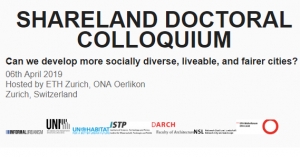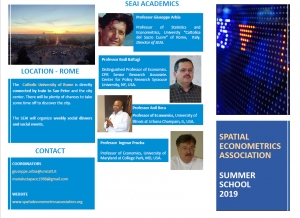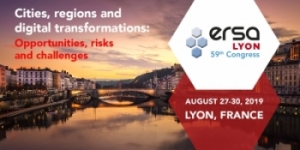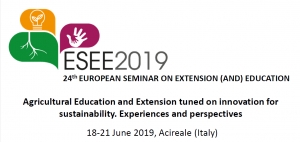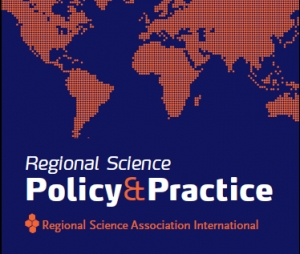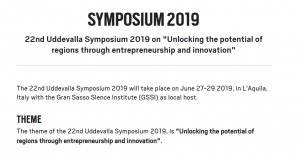Building bridges
Elisabete Martins
2nd Call | The International Congress on Sustainable Development, Public Management and Territorial Governance (28-31 May 2019, Poland)
2ndCall | The International Congress on Sustainable Development, Public Management and Territorial Governance (28-31 May 2019, Poland)
The International Congress on Sustainable Development,
Public Management and Territorial Governance
WSB University, Faculty of Applied Sciences
28-31 May 2019, Dąbrowa Górnicza, Poland
The International Congress on Sustainable Development, Public Management, and Territorial Governance are organized in cooperation:
- WSB University, Poland
- University of Extremadura, Spain
- Polytechnic Institute of Portalegre, Portugal
- University of Madeira, Portugal
- FISAT.
The congress will take place between 28 and 31 May 2018, at the Faculty of Applied Sciences,
WSB University, in Dąbrowa Górnicza, Poland.
Working agenda:
28thMay
Opening Ceremony & Gala Dinner (starting at 7 p.m.)
29thMay
Plenary session, parallel sessions (from 9 a.m. to 5 p.m.), trip to Katowice, social dinner at 7 p.m.)
30thMay
Parallel sessions, poster session (from 9 a.m. to 5 p.m.), social dinner at 7 p.m.
31stMay
Closing session, trip to Cracow with Gala Lunch (ending at 5 p.m.)
This event will explore the ongoing dynamic, emerging issues and future challenges regarding territorial governance and public management as well as the other fields of research that may have an influence on sustainable development.
Contextually, several themes will be addressed, namely: Public Management; Territorial Governance and Strategies; Cross-Border Cooperation and Inter-Regional Cooperation; Inter-Organizational Cooperation; Sustainable Planning; Sustainable Development; Smart Cities; Biodiversity Policies and Strategies; Accessibility and Connectivity Transport Systems; Sustainable Tourism Management; Sustainable Culture Management; Renewables Energies; Circular and Green Economy; Environmental Rights and Legislation; Migratory fluxes - Strategies, Management and Planning.
Early registration should be open until February 17, 2019. However, late registration will be possible as well. The registration deadline is April 30, 2019. Registration forms should be sent to the following address www.wsb.edu.pl/congress (conference registration).
Registration fees: Early Registration – 280,00 €; Late Registration – 350,00 €; Student (subject to confirmation) – 200,00 €.
The payment should be made by April 30, 2019 to the bank account:
ING Bank Śląski S.A.; 40-086 KATOWICE UL.SOKOLSKA 34; Poland
IBAN / account number: PL 05 1050 1227 1000 0023 3028 9576
code BIC (SWIFT) INGBPLPW
Transfer name: „Congress 2018” + the name of the participant
Abstracts and papers in English, Portuguese or Spanish should be submitted to the following
e-mail address: This email address is being protected from spambots. You need JavaScript enabled to view it.
The submitted abstracts will be reviewed by the Congress Scientific Committee, according to the adequacy of the contents of the Congress topics. Please submit an abstract of no more than 200 words. Posters may also be submitted – the authors should use the specific format available on the congress website. The submission process will take place between November 1, 2018, and April 30, 2019. Successful applicants will be informed on a regular basis, no later than May 5, 2019. The deadline for full papers is May 24, 2019.
The publication of the works in a Book of Abstracts (with ISBN) is foreseen as the Congress outcome.
The best works will be invited to be published - as a book chapter - by the prestigious publisher “Thomson Reuters”(7thworldwide position in scientific publications) – an additional payment of
300,00€ - the guidelines for authors could be found on the event website.
Other works will be reviewed for possible publication in Scientific Journals associated with the event:
Sustainability (ISSN 2071-1050)– special issue: Sustainable Cross-Border Cooperation: Common Planning, Policies, Strategies, Methods and Activities(Editors: Joanna Kurowska-Pysz, Rui Alexandre Castanho, Luís Loures) – publication fee according to the price list
Regional Science Policy & Practice(ISSN 1757-7802)– special issue: New trends and Dynamics on Territorial Management and Governance (Editors: Rui Alexandre Castanho, Joanna Kurowska-Pysz, Katarzyna Szczepańska-Woszczyna) – publication fee according to the price list
Forum Scientiae Oeconomia(ISSN 2300-5947), an international journal published in Poland, indexed in: EBSCO, ARIANTA, BazEkon, CEEOL, ERIH Plus, Google Scholar, Index Copernicus, PBN - Polska Bibliografia Naukowa, DOAJ (accredited by Polish Ministry of Science and Higher Education – 7 points) - no publication fees.
Revista Monfragüe Desarrollo Resiliente(ISSN 2340-5457) -the journal focuses on scientific works regarding the approach of resilience, as a more concrete approach than the traditional concept of
"Sustainability". Thus, the journal provides an open space of reflection and rigorous debate,
for those who intend to enter the study of the resilient development - no publication fees.
Congress participants shall cover the publishing costs and pay fees directly to the publishers after the paper has received positive reviews.
If the proposal is accepted and the participant cannot attend the event, it is possible to send the poster – still, the registration payment is required.
Accommodation costs are not included in the congress fee.
Suggested accommodation:
Holiday Inn**** Dąbrowa Górnicza https://hidabrowa.pl/en/
booking - until places are empty, 15thApril at latest
please contact with the hotel using e-mail: This email address is being protected from spambots. You need JavaScript enabled to view it.
in the correspondents use the contact password: WSBUniversity
the prices: 229 pln single / 279 pln double
Pogoria Residence*** Dąbrowa Górnicza http://www.pogoriaresidence.pl/en/
booking - until places are empty, 15thApril at latest
please contact with the hotel using its online booking system
in the correspondence use the contact password: WSBUniversity
the prices: 179 pln single / 233 pln double
Congress languages: preferably English, however Polish, Portuguese and Spanish can also be used (especially during parallel sessions).
Contact persons:
Joanna Kurowska-Pysz, Rui Alexandre Castanho, Julian Mora Aliseda
e-mail address: This email address is being protected from spambots. You need JavaScript enabled to view it.
Hope to see you in Poland.
Organizers
Fully funded PhD Opportunity on 'Web archives and cities: mining the web to learn our cities'
Fully funded PhD Opportunity on 'Web archives and cities: mining the web to learn our cities' hosted by the University of Birmingham and The Alan Turing Institute.
The project will explore how the dynamics of cities are reflected in and, therefore, can be sensed by mining online content. It will utilise an innovative data source of billions of archived web pages under the .uk domain during the period 1996-2013. It will exploit the unstructured textual data contained in these webpages in order to understand the changes that cities in the UK have undergone.
We are looking for a student with:
- Relevant social science background in either geography/planning/urban studies or linguistics. Alternatively, a computer science background and willingness to engage with the above disciplines.
- Strong computational background including experience in R or Python.
- Good statistical knowledge.
- Preferably, experience in Natural Language Processing and Machine Learning.
Supervisors: Dr Emmanouil Tranos and Prof Jack Grieve
More details:
Deadline: Tuesday, January 22, 2019
SHARELAND DOCTORAL COLLOQUIUM | 06th April 2019, Zurich, Switzerland
SHARELAND DOCTORAL COLLOQUIUM
Can we develop more socially diverse, liveable, and fairer cities?
06th April 2019
Hosted by ETH Zurich, ONA Oerlikon
Zurich, Switzerland
OPEN CALL
The colloquium will bring academic rigour and propose ideas within international and national frameworks, while also providing participants with the chance to share and discuss their work with both their peers as well as internationally renowned practitioners.
Three thematic tracks:
- Sharing
- Dwelling
- Co-Creating
Maximum participants: 20
Submission of abstracts: Please send your abstracts (PDF) of max. 500 words including title, authors and 3-5 keywords to This email address is being protected from spambots. You need JavaScript enabled to view it.. We highly encourage PhD students and Post/Doc researchers to apply (max. 5 years after completion of PhD).
Important Dates:
- Abstract submission: 14 December 2018
- Acceptance notice: Until 18 January 2019
- Full presentation submission: 15 February 2019
- Final presentation submission: 15 March 2019
SEAI 2019 | May 13-June 7, 2019, Rome (Italy)
Call for participation
Summer School of Spatial Econometrics Advanced Institute – SEAI 2019
May 13th to June 7th, 2019, Rome (Italy)
The 12th edition of SEAI Summer school will take place next May at the Catholic University of the Sacred Heart in Rome (Italy).
The Spatial Econometrics Advanced Institute (SEAI) is the advanced school of the Spatial Econometrics Association. It is held yearly and it consists of a 4-weeks course. It is a unique opportunity to be introduced to the methods and practice of Spatial Econometrics by the leading experts in the field.
Classes:
Week I: 13th-17th May
Spatial Statistics
Prof. Giuseppe Arbia, University “Cattolica del Sacro Cuore ” of Rome.
Week II: 20th-24th May
Spatial econometrics
Prof. Anil Bera, University of Illinois at Urbana-Champain.
Week III: 27th – 31st May
Econometric Methods for Spatial and Social Networks
Prof. Ingmar Prucha, University of Maryland, College Park, Maryland.
Week IV: 3th-7th June
Panel data
Prof. Badi H. Baltagi, Syracuse University, Syracuse, New York.
The program of activities includes:
- 4 weeks, 5 days a week (Mon-Fri), 3 hours a day devoted to lectures in the mornings, 2 hours a day in the afternoon devoted to computer laboratory in R,
- weekly school events (visit to museum, walking or biking in Rome, weekly dinner);
- one social dinner;
How to apply
- The deadline for applications is January 31, 2019.
- Application form can be downloaded at: http://www.spatialeconometricsassociation.org/prova/home-advanced
- Applications must be sent to This email address is being protected from spambots. You need JavaScript enabled to view it. with the subject: “Application SEAI Summer School2019”
- Selected candidates will be notified by April 7, 2017.
All details may be found at: http://www.spatialeconometricsassociation.org/prova/home-advanced/
Reminder Call for ERSA2019 Special Session Proposals
Dear colleagues,
As former contributors to ERSA Congress programme, we cordially invite you to submit proposals for Special Sessions for next year's Congress which will take place from 27- 30 August, 2019 in Lyon, France.
Special Sessions must be related to the congress theme "Cities, regions and digital transformations: Opportunities, risks and challenges” or especially hot topics within the congress scope. We also have the ambition to have a stronger interdisciplinary dimension featuring contributions from social sciences, engineering and big data.
The submission deadline: December 7th, 2018
The special Session proposals must be submitted using the following online submission form. Please note that, in addition to contact information of the primary convenor, names of any co-convenors, the title, and description of the Special Session, we also ask you to list three interested presenters in your submission form. Please also read below the guidelines for ERSA2019 Special Sessions or visit the Congress website.
We look forward to receiving your proposals for Special Sessions. Should you have any questions, please contact us at This email address is being protected from spambots. You need JavaScript enabled to view it. .
Louafi Bouzouina and Dominique Mignot, Co-chairs of the Local Organising Committee
Guidelines for special sessions
What do we offer?
Special Sessions are a label of quality in the ERSA congress and we accommodate for this in several ways:
• We aim to allow 30 minutes for each presentation slot in a Special Session
• Each presentation in a Special Session will be assigned a discussant
What do we ask?
• Each Special Session has a minimum of 4 registered presenters
• Presenters apply for a special session on the basis of a (draft) paper or an extended abstract (deadline February 28th 2019)
• Presentations scheduled in special sessions are based on a (draft) paper that has been uploaded on the ERSA 2019 submission website before June 10th 2019
• If a Special Session does not meet the conditions, it will still be included in the programme, labelled as an O-session.
Call for Papers | ESEE 2019, 18-21 June 2019, Acireale (Italy)
Dear colleagues,
We are pleased to announce that the 24th EUROPEAN SEMINAR ON EXTENSION (AND) EDUCATION, "Agricultural Education and Extension tuned on innovation for sustainability" (https://www.reterurale.it/esee2019), will be held in Acireale, Sicily, from Tuesday 18 till Friday 21 June 2019. Attached is the Call for Abstracts.
On behalf of the ESEE Committee,
Patrizia Proietti and Simona Cristiano
Assistant Professor, Spatial Statistics and Quantitative Methods, School of Geography and Development, The University of Arizona
Job Title: Assistant Professor, Spatial Statistics and Quantitative Methods, School of Geography and Development, The University of Arizona
Link to Apply: https://uacareers.com/postings/33736
Review of Applications Begins: January 14, 2019
Job Description:
The School of Geography and Development seeks a tenure-eligible Assistant Professor in spatial statistics and quantitative methods who will advance the School’s research in the use of such methods to address pressing social, political, and economic issues in cities. Research priorities are for a scholar using data science and/or modelling to analyze complex, large data sets, such as population or Census, Smart Cities, finance, policing and emergencies, transportation, logistics, communications, energy or sustainability. We may show preference for applicants whose research aligns with the School’s cross-cutting initiatives in Future Geographies or Environmental and Social Justice.
Please note that if invited to a campus interview, candidates will be asked whether it is permissible to video or audio record their research talk and to post it on a limited-access account to ensure that voting eligible members of the relevant unit have access to information in the event they are unable to attend the presentation(s). Any recordings that are made will be subject to the university retention schedule and will be accessible only to authorized university personnel.
At the University of Arizona, we value our inclusive climate because we know that diversity in experiences and perspectives is vital to advancing innovation, critical thinking, solving complex problems, and creating an inclusive academic community. As an Hispanic-serving institution, we translate these values into action by seeking individuals who have experience and expertise working with diverse students, colleagues, and constituencies. Because we seek a workforce with a wide range of perspectives and experiences, we provide equal employment opportunities to applicants and employees without regard to race, color, religion, sex, national origin, age, disability, veteran status, sexual orientation, gender identity, or genetic information. As an Employer of National Service, we also welcome alumni of AmeriCorps, Peace Corps, and other national service programs and others who will help us advance our Inclusive Excellence initiative aimed at creating a university that values student, staff and faculty engagement in addressing issues of diversity and inclusiveness.
Outstanding UA benefits include health, dental, and vision insurance plans; life insurance and disability programs; UA/ASU/NAU tuition reduction for the employee and qualified family members; state and optional retirement plans; access to UA recreation and cultural activities; and more!
The University of Arizona has been listed by Forbes as one of America’s Best Employers in the United States and WorldatWork and the Arizona Department of Health Services have recognized us for our innovative work-life programs.
Duties and Responsibilities:
The Assistant Professor will teach a mix of undergraduate and graduate courses in quantitative methods and in topical areas to support our programs in Urban and Regional Development and Geographic Information Systems and Technology. Instructional duties may involve a mix of in-person and on-line offerings. The appointee will also participate in the activities of the Graduate Interdisciplinary Program in Statistics. The distribution of effort will normally be 40% Research, 40% Teaching, and 20% Service.
Minimum Qualifications:
We seek a scholar with a strong research record and a promising agenda for future work. A Ph.D. in Geography or a related field is required by the time of appointment. Applicants in related fields should demonstrate that their research is sufficiently geographical to fit within a multi-faceted Geography department.
Please contact the hiring department if you have any questions about the recruitment:
David Plane Professor and Chair of the Search Committee This email address is being protected from spambots. You need JavaScript enabled to view it.
The latest issue of Regional Science Policy & Practice are available! Volume 10, Issue 4 Pages 249-410, November 2018
 Volume 10, Issue 4
Volume 10, Issue 4
Pages: 249-410
November 2018
ISSUE INFORMATION
Pages: 249-250
SPECIAL SECTION: WALLED TERRITORIES
Pages: 251-252
Italy as a gateway to Europe for African migration: How to deal with the Doll's House effect?
Alberto Brugnoli, Matteo Matteini
Pages: 253-268
From fence to wall? Changes in the mental space of border zones in Eastern Europe
Pages: 269-282
Border permeability and socio‐spatial interaction in Turkish and the EU border regions
Pages: 283-297
Physical walls, invisible barriers: Palestinian women's mobility in Jerusalem
Tamara Kerzhner, Sigal Kaplan, Emily Silverman
Pages: 299-314
Pages: 315-334
OTHER ARTICLES
Spatial aspects of devolution in the UK: The case of England
Pages: 335-346
Performance within a recession: The converging trajectories of retail centres in the UK
Vassilis Tselios, Dionysia Lambiri, Les Dolega
Pages: 347-365
Martin Andersson, Johan P. Larsson, Joakim Wernberg
Pages: 367-381
How public participation could improve public decisions on rail investments?
Francesca Pagliara, Irina Di Ruocco
Pages: 383-403
BOOK REVIEWS
Pages: 405-406
Pages: 406-408
ACKNOWLEDGEMENT TO REFEREES
Pages: 409-410
22nd Uddevalla Symposium 2019, June 27-29 2019, in L'Aquila, Italy
SYMPOSIUM 2019
22nd Uddevalla Symposium 2019 on "Unlocking the potential of regions through entrepreneurship and innovation"
The 22nd Uddevalla Symposium 2019 will take place on June 27-29 2019, in L'Aquila, Italy with the Gran Sasso Sience Institute (GSSI) as local host.
THEME
The theme of the 22nd Uddevalla Symposium 2019, is "Unlocking the potential of regions through entrepreneurship and innovation".
KEYNOTE SPEAKERS
Prof. Martin Andersson
Blekinge Institute of Technology (BTH), Karlskrona, Sweden
Prof. Ron Boschma
Utrecht University, The Netherlands
Assoc. Prof. Simone Ghezzi
University of Milano-Bicocca, Italy
Prof. Maureen McKelvey
University of Gothenburg, Sweden
Prof. Maria Minniti
Syracuse University, USA
PhD. Raquel Ortega-Argilés
University of Birmingham, UK
PhD. Simon C. Parker
Western University, Canada
Prof. Olav Sorenson
Yale University, USA
Prof. Dr. Rolf Sternberg
Leibniz University Hannover (LUH), Germany
Prof. Elin Wihlborg
Linköping University, Sweden
Ass. Prof. Ting Zhang
University of Baltimore, USA
CALL FOR PAPERS
Call for papers will be announced in the end of November 2018.
More information at: https://symposium.hv.se/symposium-2019/
New issue (number 41) of Investigaciones Regionales - Journal of Regional Research
Dear colleague:
We have just published a new issue of the journal Investigaciones Regionales - Journal of Regional Research (Issue Nº 41). It is now available both on line and print version.
About Investigaciones Regionales – Journal of Regional Research:
The founding aim of Investigaciones Regionales–Journal of Regional Research was to create a prestigious journal through which to disseminate quality research carried out in the broad academic and professional field of regional, urban and territorial studies. The review process of the papers submitted to the Journal follows international standards.
Investigaciones Regionales-Journal of Regional Research is ranked as Q2 by Scimago JRC (Scopus), in Economics, Econometrics and Finance, and indexed in other scientific and academic international databases (Emerging Source Citation Index (ESCI), EBSCO, ProQuest, EconLit, RePec, DOAJ, Redalyc, Latindex, Fuente Académica,…).
The Journal has a multidisciplinary approach, welcoming submissions from fields such as Economics, Geography, Sociology, Land Planning and Political Science, whose scientific focus, originality and added value contribute to the dissemination of new ideas and methodological approaches, strengthening and improving the quality of the publication, via its This email address is being protected from spambots. You need JavaScript enabled to view it..
The contents of this issue are:
Articles:
- Desigualdades y políticas regionales en América Latina: una visión actual - Julieta Llungo-Ortiz
- Redistributive effects of regional transfers: a conceptual framework - Julio López-Laborda, Antoni Zabalza
- Crecimiento Económico Regional. El caso de la Provincia de Río Negro (Argentina) - Pablo Tagliani
- Los niveles de eficiencia técnica y el cambio productivo en la gestión tributaria de las regiones españolas - Blanca Avellón Naranjo, María José Prieto Jano
- Regional differences in the Okun’s Relationship: New Evidence for Spain (1980-2015) - Roberto Bande, Ángel Martín-Román
- Forced displacement and Multidimensional Poverty in Antioquia, Colombia: an assessment by means of a Seemingly Unrelated Regression - Osmar Leandro Loaiza Quintero, Guberney Muñetón Santa, Juan Gabriel Vanegas
Methodological and Research Notes:
- Aplicación SIG-Web SADE-MC para verificar la percepción de las edificaciones presentes en el entorno rural extremeño - Jin Su Jeong, David González-Gómez
- Crecimiento empresarial y políticas públicas de desarrollo regional en EUROACE - María del Mar Miralles-Quirós, José Luis Miralles-Quirós, Julio Daza-Izquierdo
European Regional Policy:
- El Fondo FEDER (2014-2020) en las Regiones Españolas - Javier Escribá, María José Murgui
Books reviews:
- Knowledge and Institutions - Simón Sánchez-Moral
To contact Us and Submit Manuscripts:
Investigaciones Regionales – Journal of Regional Research
Email: This email address is being protected from spambots. You need JavaScript enabled to view it.
The article will be sent through the portal Open Journal System (OJS) of the Spanish Repository of Science and Technology (RECYT): https://recyt.fecyt.es/index.php/IR/login .
Yours sincerely,
Investigaciones Regionales – Journal of Regional Research
About Us
The Regional Science Association International (RSAI), founded in 1954, is an international community of scholars interested in the regional impacts of national or global processes of economic and social change.


